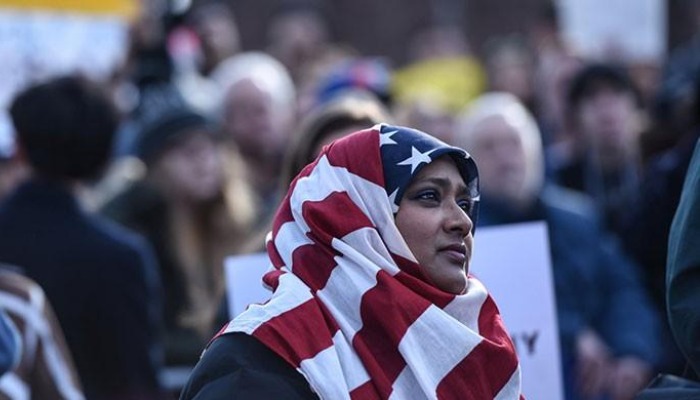American Muslims twice as likely to attempt suicide: study
8% of Muslims reported a suicide attempt as compared to 6% Catholics, 5% of Protestants and 3.6% Jews: Stanford study
August 11, 2021

- Structural issues such as religious discrimination and hate crimes contribute to poor mental health in Muslims.
- Cultural barriers and community stigma around mental health persist, says Dr Farha Abbasi.
- Muslim Americans are more willing to seek help from religious leaders, says psychologist at Khalil Center.
A study published in JAMA Psychiatry last month found that American Muslims are twice as likely to have attempted suicide as compared to other religious groups, reported NPR on Tuesday.
According to the study, in a survey, 8% of Muslims reported a suicide attempt as compared to 6% Catholics, 5% of Protestants and 3.6% of Jews.
One of the researchers of the study, Rania Awaad, who is the director of the Muslim Mental Health & Islamic Psychology Lab at Stanford University, told NPR that they have seen an uptick in suicides and suicide attempts.
She said the uptick in numbers can be attributed to several issues. However, religious discrimination and community stigma have been identified as the major factors which prevent American Muslims from seeking mental health services, she said.
In Texas, earlier this year, a murder-suicide involving a Muslim family sent shockwaves through the community. Two brothers, both of whom reportedly battled depression, made a pact to kill themselves by suicide and kill the rest of their family so they would not have to live with the grief.
The incident sparked an urgency for public discussions on mental health and training on suicide response.
Awaad said that the community has a long way to go still and the discussion has "only begun”.
60% of Muslims have reported religious discrimination
Dr Farha Abbasi, a founder of the Muslim Mental Health Conference, stated that she was not surprised by the results of the Stanford study. "Right now, the exposure to toxicity is making us more vulnerable," she said.
The study reported that as a religious minority in the US, "Muslims are highly vulnerable to religious discrimination, which is associated with depression, anxiety and paranoia".
A 2020 polling from the Institute for Social Policy and Understanding revealed that 60% of Muslims reported personally experiencing religious discrimination.
The FBI's 2019 hate crime statistics suggest that, of the reported 1,715 victims of anti-religious hate crimes, 13.2% were victims of anti-Muslim bias.
"There's just trauma over trauma over trauma," Abbasi said. "The impact of growing Islamophobia, the violence that is being directed against Muslims, all that is having a huge impact on mental health."
Community stigma around mental health
Naureen Ahmed, 39, recalled how her family used to visit their mother Seema at a psychiatric hospital, however, it was never openly discussed why their mother was in the hospital.
Ahmed described her mother’s situation, as, “some days, Seema would sing along to Bollywood music at home wearing red lipstick and other days, she’d walk around brandishing knives or threaten to kill herself by jumping in front of cars on the highway”.
Ahmed hesitated to invite friends over as she’d never be sure of what mindset her mother would be in on that specific day.
It wasn’t until Ahmed was 25 that she learned the reason behind her mom’s behaviour. Seema had bipolar disorder and schizophrenia, Ahmed was informed by her grandparents.
Cultural background of Muslims
A 2013 study revealed that one major factor preventing people from seeking mental health treatment is the cultural background of Muslims.
Dr Abbasi, stated: “If you believe that your mental illnesses will bring shame on you or your family, then you tend to stay silent about it."
Abbasi hopes to destigmatise mental health through the help of her conference hosted by Michigan State University.
Following the death of her mother, Ahmed created SEEMA to support families like hers who are shamed by the stigma of mental illness and are isolated by their communities.
SEEMA hosts support groups and awareness workshops at community centres and mosques to highlight the importance of mental health.
"We need to have these conversations to destigmatise and bring awareness because people think that they're alone," Ahmed said.
Religious discrimination
In November 2020, a Chicago investor, Jessica Ali, 39, broke down after separation from her husband.
She recalled that she felt she was unworthy and there was no reason for her to live. The mother of three attempted suicide for a third time in 2020, the first two being in 2008 and 2018.
Ali said they thought she was crazy and she must be a bad Muslim.
It was not until she joined a Muslim support group that Ali was diagnosed with severe depression.
Now, Ali takes medication and visits a therapist.
However, some Muslims do not get the chance to get the help and support they need.
Culturally appropriate resources can help
Muslim mental health professionals all over the country are providing culturally appropriate and religiously sensitive resources for Muslims.
Dr Sameera Ahmed, director of The Family & Youth Institute, a Muslim nonprofit, developed a suicide prevention toolkit in 2017.
She stated that it is important to translate research into culturally tailored resources that help disseminate information better.
In 2017, a faith-based mental health service, Khalil Center, launched a hotline for those in crisis situations. There is more awareness being created, the psychologist at Khalil Center informed media.
Besides such avenues, it is important for Imams too to promote community mental health because Muslim Americans are more willing to seek help from religious leaders.
To aid in this, Awaad started a campaign in which 500 Muslim leaders are being trained on suicide response.
Dr Heather Laird, the founder of the Center for Muslim Mental Health and Islamic Psychology revealed that Muslims are more likely to seek therapy if it is aligned with Islamic values and she has started a movement for Islamic psychology.









